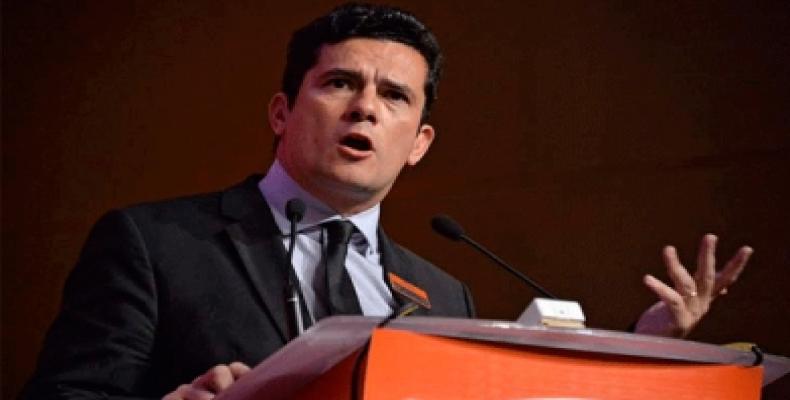Brasilia, June 10 (RHC)-- Glenn Greenwald's publication "The Intercept Brazil" has revealed an extensive and hard-hitting expose on the political motivations behind Operation Car Wash (Lava Jato) task force against former president Luiz Inacio Lula da Silva and the Workers' Party (PT), as well as the unethical involvement of the current Minister of Justice Sergio Moro.
The documents were released in a three-part series where it is proven, based on leaked documents and messages between prosecutors and Moro the "apolitical" and "unbiased" team spent hours internally plotting how to prevent the return to power by Lula and his Workers' Party.
"These stories are based on a massive archive of previously undisclosed materials -- including private chats, audio recordings, videos, photos, court proceedings, and other documentation -- provided to us by an anonymous source. They reveal serious wrongdoing, unethical behavior, and systematic deceit about which the public, both in Brazil and internationally, has the right to know," the journalists stated.
On the first article, The Intercept argues with evidence, that despite being portrayed in Brazil and around the world as apolitical and concerned solely with fighting corruption, the Car Wash prosecutors "plotted to prevent the Workers' Party (PT) from winning the 2018 presidential election by blocking or weakening a pre-election interview."
On Sept. 28, 2018, after Supreme Court Justice Ricardo Lewandowski authorized that the then jailed Lula could give interviews as part of free speech rights, one of the prosecutors, Laura Tessler, warned in the chat room that "a press conference before the second round of voting could help elect Haddad," referring to PT's presidential candidate Fernando Haddad.
While the chief of the prosecutor task force, Deltan Dallagnol, said that they should "pray" so that the PT doesn't return to power. In a series of ongoing conversations, the prosecutors, including Dallagnol, actively strategized on how to undermine the possible effect of the interviews or how to even stop them from happening.
"Over the course of more than two years, Moro suggested to the prosecutor that his team change the sequence of who they would investigate; insisted on less downtime between raids; gave strategic advice and informal tips; provided the prosecutors with advance knowledge of his decisions; offered constructive criticism of prosecutorial filings; and even scolded Dallagnol as if the prosecutor worked for the judge," the report reads.
These sort of conduct, if true, is unethical for a judge, who is responsible for maintaining neutrality to guarantee a fair trial, and it violates the Judiciary's Code of Ethics for Brazil. Yet these are not new accusations, as Lula's defense teams have stated Moro's questionable involvement since the begin of the probe.
"Judge Moro made his bias and political motivation clear from the beginning to the end of the process," Lula's legal defense team said back in July 2017, adding that his judgment has shamed Brazil by ignoring overwhelming evidence of innocence and succumbing to political bias whilst overseeing continual breaches of basic human rights and the legal process.
Bolsonaro then, according to many, rewarded Moro by creating an unprecedented powerful position now called the super justice minister, which has complete control over all the judicial branch, policing and social control in Brazilian society.
Finally, the report concludes with the fact that while publicly boasting about the strength of the evidence against Lula, internally the Car Wash task force doubted on the lack of hard evidence and the case built against the former president.
They will say that we are accusing based on newspaper articles and fragile evidence-- so it’d be good if this item is wrapped up tight. Apart from this item, so far I am apprehensive about the connection between Petrobras and enrichment, and after they told me I am apprehensive about the apartment story, wrote Dallagnol in a group Telegram chat with his colleagues on September 9, 2016, four days before filing their indictment against Lula.
Valeska Texeira Zanin Martin, a lead lawyer in Lula's defense team, said evidence "definitely proves that Lula could not have been given a bribe." The lawyer argued that bank and real estate records proved Lula's innocence.
The three-story beach apartment couldn't have been given to Lula as a bribe, as prosecutors alleged because it is registered in the name of the company OAS with financial rights in a federal bank account. Zanin Martin said that if the company sold the apartment, the money trail would have to appear in the federal bank transactions, where records prove that Lula did not acquire the property.
Yet as proof in an internationally mocked and criticized trial, Dallagnol presented a PowerPoint slide filled with typos that had Lulas name in the middle and alleged crimes circled and pointing to his name. No documentation or hard evidence was ever produced against the PTs leader.
On Sunday night, Justice Minister Moro responded to the Intercept investigation saying that he "laments the lack of indication of the source", yet does not deny any accusation. Moreover, Moro defends that "there is no sign of any abnormality or providing directions as a magistrate, despite being taken out of context..." Meanwhile, the Car Wash task force did not refute the authenticity of the information published by The Intercept.


